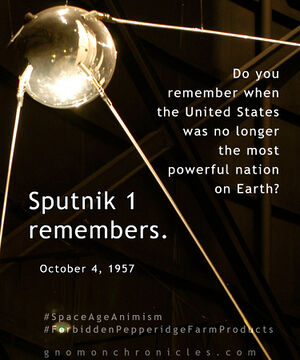Diary (October 4, 2020): Difference between revisions
No edit summary |
No edit summary |
||
| (6 intermediate revisions by the same user not shown) | |||
| Line 5: | Line 5: | ||
== Diary == | == Diary == | ||
=== | === Gentle McCloud === | ||
[[Gentle McCloud]] = [[Gentle Ben, Bounty Hunter]] meets McCloud. | |||
Sputnik-1 remembers. | === Croesus Actor === | ||
[[Croesus Actor]] | |||
=== Immediocracy === | |||
The [[Immediocracy]] | |||
=== Hyundai Vandal's Almanac === | |||
The [[Hyundai Vandal's Almanac]] | |||
=== Logical Positivism Mystery Stories === | |||
[[Logical Positivism Mystery Stories]] | |||
=== Symphony No. 6 (Glass) === | |||
''Symphony No. 6'', also known as the ''Plutonian Ode Symphony'', is a symphony composed by [[Philip Glass (nonfiction)|Philip Glass]]. It is based on the poem ''Plutonian Ode'' by [[Allen Ginsberg (nonfiction)|Allen Ginsberg]]; parts of which are sung by the soprano soloist in the work. The symphony was commissioned by Carnegie Hall in honor of Glass' 65th birthday and as a vehicle for the talents of soprano Lauren Flanigan. The symphony premiered on February 2, 2002 at Carnegie Hall with Dennis Russell Davies conducting the American Composers Orchestra. The symphony is in three movements, based on the three parts of the poem itself. | |||
* [https://en.wikipedia.org/wiki/Symphony_No._6_(Glass) Symphony No. 6 (Glass)] - | |||
=== Most powerful nation === | |||
1957, the eve of Mutually Assured Destruction. | |||
The two Superpowers are about to decide if the United States can drive the Soviet Union bankrupt before itself collapsing under Mutually Assured Bankruptcy — *without blowing up the planet*. | |||
The concept of "most powerful nation" may yet kill us all. | |||
* [https://www.facebook.com/photo/?fbid=10224279715399130&set=a.10210195271656839&comment_id=10224279829121973&reply_comment_id=10224280931109522 Comment] @ Facebook | |||
=== Sputnik 1 Remembers === | |||
[[File:Sputnik_1_Remembers.jpg|link=Sputnik 1 Remembers|thumb|Do you remember when the United States was no longer the most powerful nation on Earth? [[Sputnik 1 Remembers|Sputnik-1 remembers]].]] | |||
Do you remember when the United States was no longer the most powerful nation on Earth? | |||
[[Sputnik-1 Remembers|Sputnik 1 remembers]]. | |||
== In the News == | == In the News == | ||
Latest revision as of 11:08, 4 October 2020
Online diary of Karl Jones for Sunday October 4, 2020.
Previous: Diary (October 3, 2020) - Next: Diary (October 5, 2020)
Diary
Gentle McCloud
Gentle McCloud = Gentle Ben, Bounty Hunter meets McCloud.
Croesus Actor
Immediocracy
The Immediocracy
Hyundai Vandal's Almanac
Logical Positivism Mystery Stories
Logical Positivism Mystery Stories
Symphony No. 6 (Glass)
Symphony No. 6, also known as the Plutonian Ode Symphony, is a symphony composed by Philip Glass. It is based on the poem Plutonian Ode by Allen Ginsberg; parts of which are sung by the soprano soloist in the work. The symphony was commissioned by Carnegie Hall in honor of Glass' 65th birthday and as a vehicle for the talents of soprano Lauren Flanigan. The symphony premiered on February 2, 2002 at Carnegie Hall with Dennis Russell Davies conducting the American Composers Orchestra. The symphony is in three movements, based on the three parts of the poem itself.
Most powerful nation
1957, the eve of Mutually Assured Destruction.
The two Superpowers are about to decide if the United States can drive the Soviet Union bankrupt before itself collapsing under Mutually Assured Bankruptcy — *without blowing up the planet*.
The concept of "most powerful nation" may yet kill us all.
- Comment @ Facebook
Sputnik 1 Remembers

Do you remember when the United States was no longer the most powerful nation on Earth?